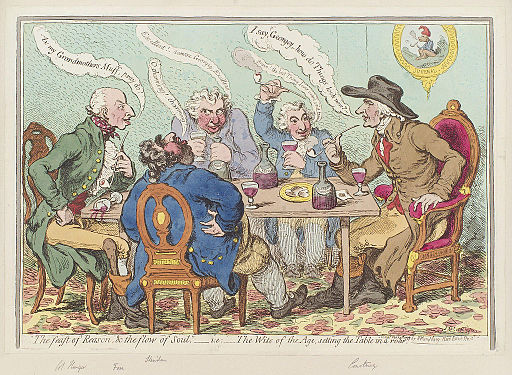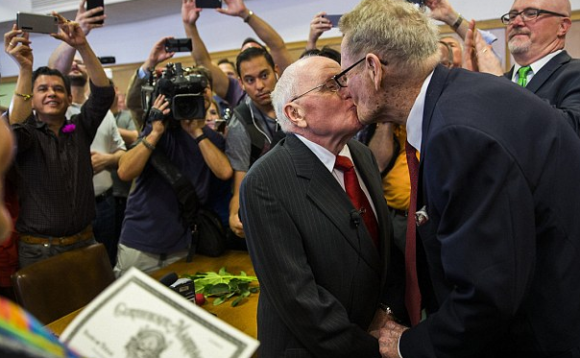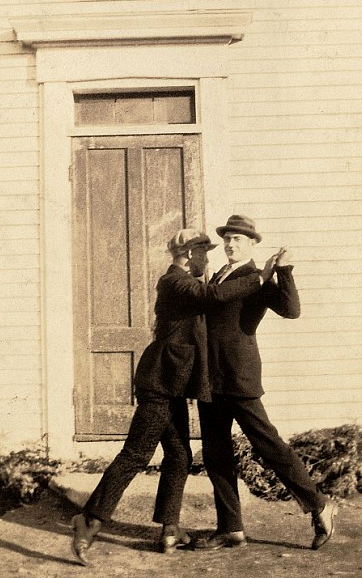Originally published by ANewDomain.net:
Michaelangelo said: “Every block of stone has a statue inside it and it is the task of the sculptor to discover it.”
 I thought of this famous quote on Friday when I heard that the United States Supreme Court had overturned laws against same-sex marriage in every state.
I thought of this famous quote on Friday when I heard that the United States Supreme Court had overturned laws against same-sex marriage in every state.
The court’s majority didn’t legislate from the bench — they confirmed an intrinsic constitutional right. The justices revealed something that was hardwired into the document back in 1789.
It just took a while.
This is what Justice Anthony Kennedy, who wrote the majority opinion, argued: Everyone has a “fundamental right” to marriage. This line of reasoning has been criticized by conservatives as well as by some liberal legal analysts who would have preferred to rely on the Equal Protection Clause of the U.S. Constitution: If straight people can get married, why not gays?
But that would have been very 2015 — very small, lowbrow, petty, the kind of thing that Bill or Hillary Clinton would come up with.
Justice Kennedy aimed high, harkening back to the Age of Reason 250 years ago.
 That is when philosophers and politicians agreed that there were certain inalienable, inherent rights.
That is when philosophers and politicians agreed that there were certain inalienable, inherent rights.
The list of those rights has expanded steadily over the years, especially in other countries, some of which even go so far as to include the right to a job or the income equivalent of one, not to mention housing and healthcare.
Here in the United States, however, the tendency has been to yield to the conservative side, which has steadily pushed for a society in which one’s responsibilities to the state are constantly increasing in scope. At the same time, one’s rights – to be free from unreasonable search and seizure and to enjoy private communications, for example – erode to virtually nothing.
That, almost more than any joy you get in watching men who fall in love with men and women who fall in love with women marry one another, is the real cause for celebration.
Said presidential candidate Mike Huckabee:
Conservative Republicans are accusing the court of legislating from the bench … the Supreme Court can no more repeal the laws of nature and nature’s God on marriage than it can the law of gravity.”
Well, actually it can: Despite people like Huckabee, the United States is still a secular nation.
Added Bobby Jindal,
Marriage between a man and a woman was established by God, and no earthly court can alter that.”
 Again, it can and it did. But I think Huckabee and Jindal are wrong — not only on the legal side of the argument, but on the religious one, too.
Again, it can and it did. But I think Huckabee and Jindal are wrong — not only on the legal side of the argument, but on the religious one, too.
There is literally nothing in Christianity that prohibits same-sex marriage.
Yes, I know. There are those sections in Leviticus and other passages in the Old Testament that Christian conservatives like to say prohibit gay sex. But in cases where the Old Testament conflicts with the New Testament, the New Testament prevails the same way that a newer law prevails over an older one in Civil Code.
And the New Testament is clear: Everyone is redeemed by Jesus’ self-sacrifice.
In other words, in a Christian sense, we are all forgiven.
 There is, and there never was, any good reason to prohibit same-sex marriage. When the idea first came up, in the 1980s and 1990s in the United States, I remember asking myself two questions.
There is, and there never was, any good reason to prohibit same-sex marriage. When the idea first came up, in the 1980s and 1990s in the United States, I remember asking myself two questions.
First: Why would gay people even want to get married? And then: What would be the harm?
No one has ever been able to articulate to my satisfaction, or evidently to the satisfaction of the majority of the American voting public, exactly what problems would be created by guys marrying guys and girls marrying girls.
The best that the right wing has ever been able to come up with is some empty pabulum about the “sanctity of marriage.” Please.
How on Earth does someone else’s marriage, or lack thereof, affect yours?
 The answer to that question is: It can’t. It doesn’t. Most people realize that. That’s why this debate has moved so quickly.
The answer to that question is: It can’t. It doesn’t. Most people realize that. That’s why this debate has moved so quickly.
It is also worth noting that conservatives only have themselves to blame for this week’s historic court ruling.
Stonewalling “civil unions” is what led to the SCOTUS same-sex marriage decision …
And remember “civil unions?”
Civil unions were the legal compromise homosexuals wanted in lieu of gay marriage – not full-fledged same-sex marriage, but an arrangement that protected the legal rights of a gay or lesbian to, for example, visit their partner in the hospital or inherit their property after they died.
They were tired of having to legally adop t their lovers as adults and calling them “nephews” or some other far-fetched relation just to get these basic rights.
t their lovers as adults and calling them “nephews” or some other far-fetched relation just to get these basic rights.
But right-wingers stonewalled civil unions, which led to the first lawsuits filed by gays requesting the right to be married, lawsuits that many gay activists worried at the time were overreaching.
 Because Republicans, and many Democrats, including Bill and Hillary Clinton and Barack Obama, wouldn’t budge on civil unions, a more radicalized legal process was initiated.
Because Republicans, and many Democrats, including Bill and Hillary Clinton and Barack Obama, wouldn’t budge on civil unions, a more radicalized legal process was initiated.
And that is what just culminated with this week’s Supreme Court decision.
As James Antle wrote in The American Conservative in 2013:
Social conservatives avoided compromises, like decoupling some incidents of marriage from the institution itself and extending them to individuals regardless of relationship status. While this wouldn’t have satisfied those whose main goal was ‘marriage equality’ in culture and law, it might have met the need for tangible benefits like hospital visitation without the ‘separate but equal’ approach of civil unions or domestic partnerships—which social conservatives opposed in any event.”
There is a strong case to be made that Roe v. Wade’s legalization of abortion rights, and even the belief in many privacy rights (which back Roe v. Wade, for example), are not inherent in the Constitution, at least not as interpreted by so-called originalists.

Certainly, the Supreme Court has often violated the Constitution with its decisions, for example in the case of Bush v. Gore in 2000, which supplanted Florida’s right as a state to conduct its own electoral recount.
But gay marriage is not novel.
Gays have always enjoyed the constitutional right to get married. We’re just finally seeing it.

1 Comment.
If a corporate artificial person has the rights of a natural person, why can’t a natural person have the rights of a natural person?
I have never heard of a corporate merger being delayed while the gender of each corporation desirous of coupling were being determined.